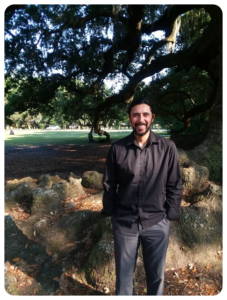Every Story Matters: Ramon
Trigger Warning: The following content contains descriptions of gambling, gambling elements, and addiction, which may be distressing for some individuals.
Ramon Zelaya is a Licensed Professional Counselor and the moderator of r/problemgambling, the largest problem gambling community on Reddit. Ramon sat down with NCPG to share his experience with problem gambling as part of Problem Gambling Awareness Month (PGAM). This year’s theme, “Every Story Matters,” is a testament to both the power and vulnerability of sharing one’s experience with problem gambling.
| NCPG: Hi Ramon, thank you for joining us. Can you please introduce yourself and tell us a little bit about yourself?
Ramon: Sure. My name is Ramon Zelaya. I’m a Licensed Professional Counselor in Louisiana. I have been working in the behavioral health space for over 20 years. I started working as a problem gambling counselor and then as a problem gambling prevention coordinator for Clackamas County in Oregon. I learned a great deal about not just treatment and theory behind some of the causes and some of the effective treatments for gambling disorder, but also matters of public policy and matters related to the gambling industry and how they intersect with problem gambling prevention and treatment efforts. NCPG: Thank you. Did you have any experience with problem gambling prior to that role? |
 Photo courtesy of Ramon Zelaya |
Ramon: Not really, but I was interested in the topic, and I had attended a couple trainings specific to problem gambling. I can’t remember how that came about, but it was interesting to me, and I thought that it was kind of neat. It hadn’t occurred to me that this was something that I would really fall into.
NCPG: Can you talk a little bit about r/problemgambling and what inspired you to create that online community?
Ramon: I just remember one night I was just curious if there was a subreddit specific to problem gambling.
There was one and it had a small handful of posts. It was clearly not taking off and it didn’t have a very robust description as I remember. I wanted to take what I had known, and create this space for the purposes of raising problem gambling awareness, and to provide resources for people who were affected personally, whether they were friends or family of somebody with a gambling problem, a person with a gambling problem themselves, or therapists who encountered gambling disorder in their practice and didn’t have the resources or the information on how to treat it.
It grew into being primarily for people who are seeking support for themselves or for their loved ones. I insist on keeping it a space that’s open and available for researchers, treatment providers, and the public just to raise awareness of this epidemic.
NCPG: For those who might not be as familiar with Reddit as a social media platform, can you explain a little bit about how r/problemgambling is structured?
Ramon: Reddit started off as a news aggregate site where it was just people posting things that they found interesting. It gradually expanded, and eventually Reddit decided to sort of subdivide itself. People can start their own communities on specific topics, from movies to anime to knitting. It grew into a place for people to create their own space and support that space for others.
I think for a lot of people, [r/problemgambling] is sort of their first step into talking about their story or writing their story down and putting it out there for others to see. I think oftentimes people stumble upon it and they’ll read other people’s stories. In time, I think a lot of folks that – just by reading other people’s stories – get that sense of connection and knowing that they’re not alone. And that emboldens them to start their own account and share their story.
Others will come in and comment and be very supportive, or maybe chime in and say like, yeah, that really resonated with me. You know, I’m also 29 and I’ve been doing crypto for X number of years, that sort of thing.
It’s a great sort of space for people to come in and dip their toes in the water, so to speak. And then, when they’re ready, immerse themselves in the conversation.
Now we have people who jump in and say, day 129, day zero, day 32, where they’ll use it as an accountability space to count the number of days that they’ve gone without gambling. They motivate themselves and others to keep it up and to move forward towards recovery. And also, to ask questions and share stories on how to recover from a gambling disorder.
NCPG: Are there any changes in r/problemgambling that stand out to you during the last few years?
Ramon: I’ve seen the demographics grow younger, unfortunately. Loot boxes and video games, trading cryptocurrency and sports betting, just the explosion of sports betting has captured the attention and engagement of younger gamblers. Folks starting in their teens.
I’ve had 16-year-olds post on the subreddit. I couldn’t tell you the youngest age, but that’s not uncommon. I have noticed that the college age demographic tends to gravitate towards sports betting, online poker, trading cryptocurrency, that sort of thing.
NCPG: Is r/problemgambling the largest problem gambling community on Reddit?
Ramon: We just recently hit 26,000 subscribers. I guess growth is good because you know, you’re reaching out to more people. But it also means that this problem is not shrinking.
NCPG: What do you find most meaningful about that work?
Ramon: What’s meaningful to me is that people are getting the message that, yeah, problem gambling is an issue, it is a real thing. It is not a matter of weakness, it’s a diagnosable disorder. And more importantly, there are people who can relate and people who can help. It feels great to see comments and people posting saying how grateful they are that the subreddit exists.
When I have time, I’ll jump in and answer questions and comment from my perspective, to try to guide people on the right track, so that misunderstandings are turned into understandings about this illness, and that eyes are opened where they weren’t before. I guess, as long as people keep posting, I’ll keep responding.
NCPG: How do you stay optimistic or hopeful throughout all of this?
Ramon: I suppose knowing that there’s more people to reach out to. Research is ongoing worldwide, and as we understand this illness better, we’re only going to be able to better serve the people who are impacted by it.
My goal is to really try to be as comprehensive as possible, to make resources and information available to people so that they can start putting pieces of the puzzle together themselves. My hope is to continue to serve as a hub for information and to hopefully keep up with the latest research as we learn more. We want to make that available to people because they need it, and they deserve it.
NCPG: What’s something that you wish the average American knew about problem gambling?
Ramon: That’s a good question. I think that people generally need to realize that when you place a bet, you have got to expect to lose that money. Like it’s gone. And if you win the bet and you make something from it, consider yourself damn lucky.
I find that people view gambling in all its forms as something that implies status, something that implies excitement. Implies dreams of a better future. Like, oh, if I strike it big, then all these problems are going to go away. But that’s not the right approach. I think people need to be very realistic about what it is that they’re actually doing.
I would love for folks to have a full and clear understanding that, in all likelihood, it’s not going to be in your favor. If those machines and the table were as hot as people who gamble would like them to be, casinos wouldn’t exist. I mean, they’re there to generate revenue. You don’t generate revenue by giving your income to winnings all the time.
NCPG: Shifting gears, we mentioned earlier that the theme for this year’s problem gambling awareness month is Every Story Matters. Can you talk a little bit about your interpretation of that theme?
Ramon: One of the things that tends to discourage people from going to community support programs like Gambler’s Anonymous is — imagine yourself being an 18- or 19-year-old kid, you walk into a room, and it’s full of 40- to 50-year-olds talking about their blackjack problems. You go in there and you’re like, these people are older than my dad.
That’s something that I think we need to overcome. To destigmatize the problem gambling stereotype. I think we need to be willing to tell different stories so that, as a unique individual, I can look at all those stories and find one that resonates with me and one that reflects my interests, my points of view, my world view. Everything from class, to ethnic background, to age. All of those things can make or break a person’s decision to enter a recovery program.
Because they don’t feel that they’re represented, or they don’t feel that they can relate to others, And when you feel like you can’t relate to others, suddenly, they’re left to feel alone. Like, okay, yeah, people have gambling problems, but not like I do, right?
Having stories representing as many perspectives as possible destigmatizes that prototypical stereotypical gambler that we all kind of have in our heads and makes people realize that anybody can be affected.
NCPG: Thank you so much. And thank you for sharing your story with us.
If you or someone you know may have a gambling problem, contact the National Problem Gambling Helpline, which offers hope and help without stigma or shame. Call 1-800-GAMBLER, text 800GAM, or visit www.1800gamblerchat.org. Help is available 24/7 – it is free and confidential. |
|
|
r/problemgambling is a resource for individuals who have struggled - or know somebody who has struggled - with a gambling problem. Learn more at https://www.reddit.com/r/problemgambling/
|

